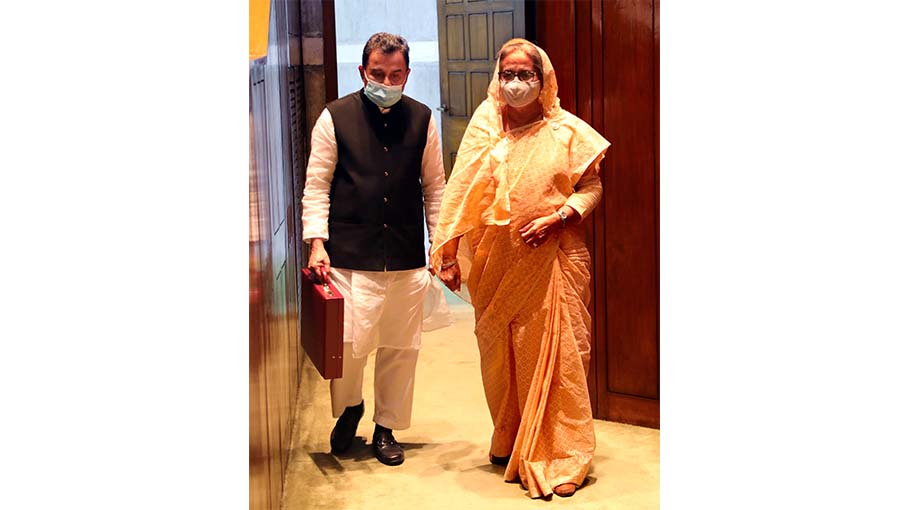Bold budget to beat snags


Despite the devastating impact of Coronavirus pandemic and Ukraine war on the economy, the government has rolled out an ambitious national budget of Tk 6.78 trillion (678,064 crore) for the 2022-23 fiscal year with the aim to attain faster development and growth.
Finance Minister AHM Mustafa Kamal placed the budget titled “Return to the Path of Development Leaving the COVID-19 Behind” in the national parliament on Thursday with a 7.5 percent GDP growth and 5.6pc percent inflation projection.
“The growth rate has been targeted to be 7.5 percent for the next FY 2022-2023, considering the lagged effects of the Covid-19 and the protracted crisis arising from the Russia-Ukraine conflict,” he said in his budget speech.
The annual expenditure outlay is equivalent to 15.23 percent of the Gross Domestic Product (GDP) and the biggest in Bangladesh's history.
The size of the proposed budget is 14.25 percent larger than the revised budget and 12.32 percent bigger than the proposed budget for the current FY which were Tk 5.94 trillion and Tk 6.04 trillion respectively.
The expenditure outlay has projected a deficit of 36.14 percent or Tk 2.42 trillion with the revenue collection and grant receipt being estimated at Tk 4.36 trillion. The deficit is equivalent to 5.4 percent of the GDP whereas GDP-budget deficit ratio was 5.1 percent in revised budget and 6.1 percent in the original budget for the current FY.
The highest allocation in the new budget has been earmarked for public administration that stands at 19.0 percent of the total outlay and it is followed by education and technology (14.7 percent), transport and communication (12 percent), and interest payment (11.9 percent).
Other sectors receiving large allocation include local government and rural development (6.6 percent), agriculture (6.2 percent), defence (5.9 percent), social security and welfare (5.5 percent), health (5.4 percent), public order and security (4.6 percent), energy and power (3.8 percent), and housing (1 percent).
The finance minister proposed Tk 5,000 as block allocation to implement emergency measures to combat the pandemic.
"The government is laying emphasis on how to combat such a complex pandemic situation as we experienced during Covid-19. To this end, the government is planning to develop the capacity to respond and control such pandemic quickly, conduct research in this sector and develop the institutional capacity, technical knowledge and skilled manpower to up-scale the overall capacity," he said.
He said the government has earmarked Tk 100 billion as block allocation to meet any emergency expenditure.
“Although the infection of Covid-19 coronavirus has reduced drastically, the fear of its reappearance still persists as the outbreak of Covid-19 is still evident in many countries. Bearing in mind the Covid-19 related health hazards, we are also proposing a block allocation of Tk 5 thousand crore for the coming fiscal year."
Mustafa Kamal said the government has decided to introduce a universal pension system from the next fiscal year.
"In the 2008 election manifesto, Prime Minister Sheikh Hasina promised to introduce a universal pension scheme nationally to ensure old-age protection for the elderly citizens under a sustainable and well-organised social security framework," he said.
The budget proposed a 15 percent tax on immovable property located abroad and a 10 percent tax on movable property if it is not brought back to the country.
The finance minister outlined six major challenges for the next fiscal year. They will be containing inflation and enhancing domestic investment; financing additional subsidy required for the increased price of gas, power and fertilizer in international markets; utilizing funds available through foreign assistance and ensuring timely completion of high priority projects of ministries/divisions; ensuring timely completion of projects in education and health sectors; increasing collection of local Value Added Tax and raising the number of individual tax-payers; and maintaining stability in the exchange rate of taka and keeping foreign exchange reserves at a comfortable level.

